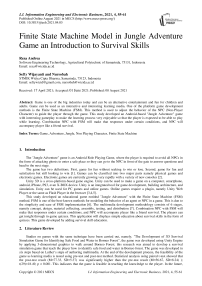Finite State Machine Model in Jungle Adventure Game an Introduction to Survival Skills
Автор: Reza Andrea, Sefty Wijayanti, Nursobah
Журнал: International Journal of Information Engineering and Electronic Business @ijieeb
Статья в выпуске: 4 vol.13, 2021 года.
Бесплатный доступ
Game is one of the big industries today and can be an alternative entertainment and fun for children and adults. Game can be used as an interactive and interesting learning media. One of the platform game development methods is the Finite State Machine (FSM). This method is used to adjust the behavior of the NPC (Non-Player Character) to guide the player through the game. This study developed an Android-based "Jungle Adventure" game with interesting gameplay to make the learning process very enjoyable so that the player is expected to be able to play while learning. Combination NPC with FSM will make that responses under certain conditions, and NPC will accompany player like a friend survival.
Game, Adventure, Jungle, Non Playing Character, Finite State Machine
Короткий адрес: https://sciup.org/15017791
IDR: 15017791 | DOI: 10.5815/ijieeb.2021.04.05
Список литературы Finite State Machine Model in Jungle Adventure Game an Introduction to Survival Skills
- J.-Y. Jung, "Application and Need of Korean Popular songs as the Educational Contents," The Journal of the Korea Contents Association, vol. 12, no. 4, pp. 174-185, 2012.
- A. Rachmatullah and M. Ha, "Indonesian and Korean high school student’s disparities in science learning orientations: an approach to multi-group structural equation modeling," Asia-Pacific Science Education, vol. 5, no. 1, pp. 1-17, 2019.
- B. S. Chung and M. S. Chung, "Homepage to distribute the anatomy learning contents including Visible Korean products, comics, and books," Anatomy & Cell Biology, vol. 51, no. 1, pp. 7-13, 2018.
- J.-E. Kim, "A Study on the Correlation between English Word-final Stop and Vowel Duration Produced by Speakers of Korean," Phonetics and Speech Sciences, vol. 3, no. 1, pp. 15-22, 2011.
- M. Tadayon and G. J. Pottie, "Predicting Student Performance in an Educational Game Using a Hidden Markov Model," IEEE Transactions on Education, vol. 63, no. 4, pp. 299-304, 2020.
- R. Andrea, "Development of" Explores the Tenggarong City" Using Autonomous Response of Adaptive NPC". International Journal of Modern Education & Computer Science, vol. 13 no. 1, 2021
- K. Park, B. W. Mott, W. Min, K. E. Boyer, E. N. Wiebe and J. C. Lester, "Generating Educational Game Levels with Multistep Deep Convolutional Generative Adversarial Networks," in 2019 IEEE Conference on Games (CoG), 2019.
- C. Tziortzioti, I. Mavrommati, G. Mylonas, A. Vitaletti and I. Chatzigiannakis, "Scenarios for Educational and Game Activities using Internet of Things Data," in 2018 IEEE Conference on Computational Intelligence and Games (CIG), 2018.
- A. Pitchai, A V Reddy, N. Savarimuthu,"Quantum Walk Algorithm to Compute Subgame Perfect Equilibrium in Finite Two-player Sequential Games", International Journal of Mathematical Sciences and Computing(IJMSC), Vol.2, No.3, pp.32-40, 2016
- M. Razakatiana, C. Kolski, R. Mandiau and T. Mahatody, "Human-agent Interaction based on Game Theory: Case of a road traffic supervision task," in 2020 13th International Conference on Human System Interaction (HSI), 2020.
- Y. F. Kurniawan, R. G. Isnanda, , & A. Asroni, "The Development of 3D Survival Simulation Game for Identifying Safe Food and Water in Borneo Forest". Emerging Information Science and Technology, vol. 1 no. 1, pp 1-7, 2020
- R. Andrea, A. Nurhuda. " Developing Edu-Game “Ulun Smart-Kid” Learning Media of Banjar Language and Game Agent with Finite State Machine Model ", International Journal of Education and Management Engineering (IJEME), Vol.10, No.5, pp.10-16, 2020
- L. Zhao and K.-C. Chen, "The Game Theoretic Consensus in a Networked Multi-Agent System," in 2018 IEEE Global Communications Conference (GLOBECOM), 2018.
- M. Mendonca, K. Papageorgiou, D. E. d. Mello, E. I. Papageorgiou, J. A. Fabri, L. B. d. Souza and R. H. C. Palacios, "Digital game-based learning in a robotics course," in 2020 11th International Conference on Information, Intelligence, Systems and Applications (IISA, 2020.
- Emilisa and R. Darmakusuma, "Virtual Pet Game Application to Train and Manage How to Raise a Cat Well and Properly," in 2020 6th International Conference on Interactive Digital Media (ICIDM), 2020.


